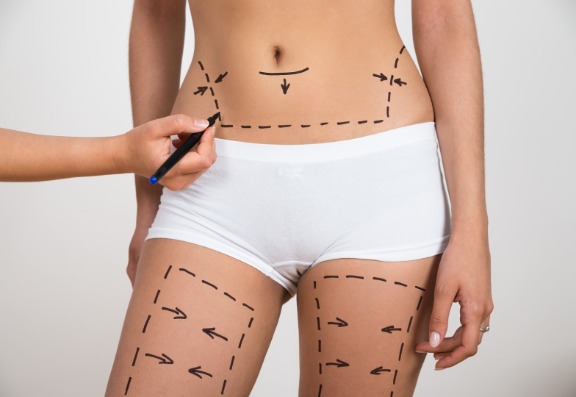A survey published in the Journal of the American Society of Plastic Surgeons revealed that 80% of liposuction patients said they were satisfied with the results of their surgery.
However, in that same survey, nearly half of those patients said they re-gained weight in subsequent months; not because the procedure didn’t work, but because they didn’t take the necessary steps to maintain their new figure.
A 2011 study by Teri L. Hernandez et al. at the University of Colorado School of Medicine set out to examine whether fat returns after removal by liposuction and if so, where it returns to.
32 healthy, non obese women were enrolled onto the study with disproportionate adipose tissue depots on the lower abdomen, hips, or thighs. Study participants agreed to not make lifestyle changes whilst enrolled.
The study found that ‘after one year … following suction lipectomy, body fat was restored and redistributed to the abdomen’.

Working in the medical aesthetics industry, I consult individuals both before and after liposuction surgery to offer support and advice on how best to optimise their results and prevent possible weight gain post-surgery.
From time to time I see individuals who have not taken the necessary diet and lifestyle steps to maintain the results of their procedure, referred to me only after they have re-gained weight in the months or years post liposuction. The individuals I see who have gained weight often suffer from undesirable pockets of localised fat in areas that were never a problem before surgery.
I believe that it is essential that patients are made aware that diet and lifestyle factors play a fundamental role in the optimising and maintaining of results following liposuction in the long term, and avoiding perhaps one of the most distressing side effects, irregular weight gain.

Research shows that hormones strongly influence where in the body fat is deposited. For example, the stress hormone cortisol is strongly linked to increased abdominal fat storage whilst oestrogen is largely responsible for weight gain on the lower extremities, namely the hips, thighs and buttocks
When fat cells have been removed from a specific site, the removal is permanent and the body is able to regain far less weight in the same area.
I’m my experience, when the body cannot store fat in the same area as it did prior to surgery, it appears to accumulate over time in a site with close proximity to the treated area.
Research also shows that failure to address diet and lifestyle factors not only results in a suboptimal aesthetic result, it could also have a negative impact on cardiovascular health.
Last year, a study published in the Journal of Clinical Endocrinology demonstrated that whilst liposuction was effective in reducing and maintaining subcutaneous abdominal fat, subjects who did not exercise showed a significant 10% increase in visceral fat. Researchers concluded that the compensatory increase in visceral fat was counteracted by physical activity.

I believe that when carried out on a patient who eats well, exercises regularly and has an optimal body weight, liposuction can significantly improve the appearance of stubborn pockets of subcutaneous fat. It can also motivate individuals to improve their diet and increase their physical activity.
It is vital patients understand that liposuction is not a weight loss procedure and that in order to maintain their results, they need to commit to a healthy diet and lifestyle long term. If they do not, they not only risk regaining new pockets of subcutaneous fat, they could potentially be putting their cardiovascular health at risk.
1. Teri L. Hernandez et al (2011) Fat Redistribution Following Suction Lipectomy: Defense of Body Fat and Patterns of Restoration. Obesity, Jul;19(7):1388-95.
2. Moyer AE, et al (1994) Stress-induced cortisol response and fat distribution in women. Obes Res. May;2(3):255-62.
3. Power ML, Schulkin J (2008) Sex differences in fat storage, fat metabolism, and the health risks from obesity: possible evolutionary origins. Br J Nutr. May;99(5):931-40.
4. Benatti F, et al. (2012) Liposuction induces a compensatory increase of visceral fat which is effectively counteracted by physical activity: a randomized trial. J Clin Endocrinol Metab. Jul;97(7):2388-95.
We thought we'd do our bit to increase awareness with 8 must-know facts.
Snatched faces stole the show at the Bezos-Sanchez wedding, but not everyone wants the surgical route to sculpted…
Struggling to manage PCOS through diet? The weight loss experts break down the best foods to support hormone balance, weight management, and overall wellbeing.
Hey, wait!
Before you go.....
Let's stay in touch, pop your details here and we'll send our editor's hand-picked updates on your fave subjects.